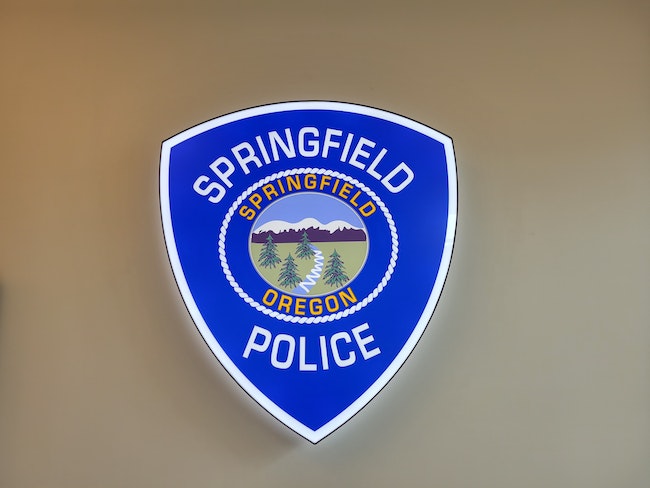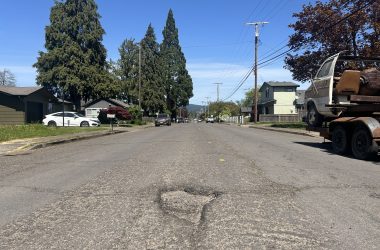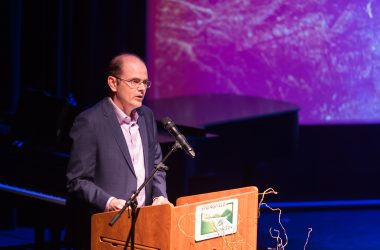 CHRONICLE PHOTO – An illuminated Springfield Police sign inside the department.
CHRONICLE PHOTO – An illuminated Springfield Police sign inside the department.
SPRINGFIELD – A key mechanism for funding police and jail services, the Springfield City Council this week provided input for renewing the Police Services Special Operating Levy.
Sam Kelly-Quattrocchi, legislative and economic development analyst for the City, provided council with the nuts and bolts of the proposed renewal, which will be up for a public hearing and subsequent adoption on June 20. The special operating levy for police services expires in June 2023 and would need to be placed on the November ballot for voter approval.
The Five-Year Local Option Levy is being pitched at a rate of $1.40, with no increase since its last renewal in 2017. If successful, the projected revenue from the levy tax collected is $37.34 million over the course of five years.
By not increasing the rate, the City hopes it will be easier to get a thumbs up from voters. After all, the services it provides are crucial for public safety in the City.
“The funding is critical,” councilor arilee Woodrow said.
Where does the money go?
This type of levy is familiar to Springfield voters. The first levy was passed November 2002 and has been followed by three successful votes for increasing amounts every five years. As it stands, the levy is providing funding for:
• Eight police officers;
• Five dispatchers;
• Five community service officers;
• Two records and communication specialists;
• Two court clerks;
• Nineteen jail positions;
• Entire jail operating budget;
• Operating costs associated with the police services positions; and
• Designated prosecution and court operating costs.
A brief history, benefits
In 2002, the levy passed to address SPD staffing, which was below the national and regional averages.
That additional staffing has worked wonders for the SPD, Kelly-Quattrocchi said, noting improved response times; an increase in police response to calls; better communication to citizens; and increased focus on specific neighborhood problems, community outreach and educational opportunities.
While the delivery of police services improved, the City’s property crime rate remained among the highest in the state. SPD then established goals for the municipal jail; specifically it focused on reducing property crime rates in Springfield.
In 2006, additional resources were sought to reduce crime rates, and a levy was passed with all of the same service expectations from the first levy, with a few add-ons. Anticipating the new jail to open in 2010, resources were added for the first three years of the jail operations.
The levy was renewed in 2012, and again in ‘17, incorporating money for the operating budget for the jail.
The operations of the jail are completely funded from the levy. The jail provides space for pre-sentenced and sentenced defendants of misdemeanor crimes. In the past five years, the jail has averaged 41 inmates per day, Kelly-Quattrocchi said.
Between 2009 and ‘21, property crime rates dropped by 52% and “person” crime rates dropped by almost 31%, according to the proposed ballot document. “I hear people saying, ‘We don’t need a jail. Let’s turn it into a new library,’ but as I see these numbers, that is a big deal,” councilor Steve Moe said.
Mayor Sean Van Gordon agreed, noting that the crime rate on Fourth and Main streets — the corner where PlankTown operates – has dropped 90% since the jail opened. “The police levy has been a big part of what we have seen downtown,” Van Gordon said, nodding to a safer downtown.
What’s next?
Before verbiage listed on the measure is crystallized, councilor Leonard Stoehr advocated for clearer verbiage for costs per household in the ballot description.
“People don’t generally think in terms of $1.40 per $1,000, or in terms of percentages,” he said. “It would be very helpful for people to get some sort of figure to get their head around.”
Councilor Joe Pishioneri said, while he agrees, the council has “been there, done that” without success, largely due to the verbiage limitation required on the ballot.
“If we can squeeze that (verbiage) in here, and still be legal, great, but I’m not holding my breath on that one,” Pishioneri said.
Kelly-Quattrocch will follow up with council at its June 20 meeting, with a levy title ballot measure and resolution for adoption. If successful, the levy will be placed on the ballot this November and will be effective in July 2023.








